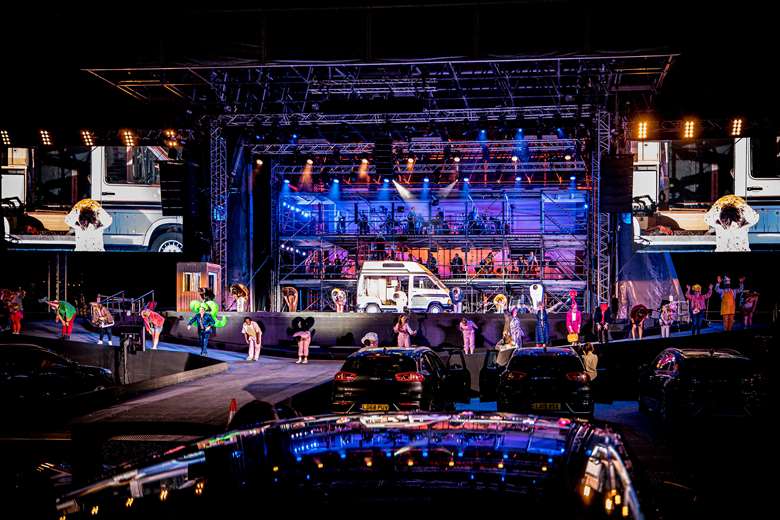How English National Opera is fighting the impact of coronavirus
Andrew Mellor
Wednesday, October 21, 2020
How English National Opera has risen to the challenges of the pandemic.

Remember the heady, carefree days of February 2020? Everything was ticking along nicely and normally. Orchestras played. People went to theatres. English National Opera was the national embarrassment the arts press always wants it to be.
Well, there is a ‘new normal’ now, as we’re continuously being told. Seven months later, ENO has become the first opera company in the country to muster a full-scale orchestra, chorus and cast of soloists and put them in front of an audience to perform a repertoire opera live. it has delivered on its plans to perform La bohème with a British cast for a drive-in audience at Alexandra Palace in north London – and in some style.
We have a duty to criticise governments when their handling of national emergencies has been lamentable. So, therefore, must arts journalists report that our big arts institutions responded to the challenges of the pandemic slowly, in many cases with a hopeless lack of imagination and in others with crippling timidity. All the while, many of their European counterparts stood and delivered, determined to demonstrate that in times of need their presence was more necessary than ever. Back home, with one or two exceptions, it was left to individual artists and independent groups to do the same.
From a distance – which is probably the universal distance we all felt at the height of the pandemic, wherever we were watching it unfold from – it never looked like ENO was wasting any time before rolling up its sleeves and taking affirmative action where it could. I feel sure this was more than just PR, however much the press office was in overdrive. ENO’s wardrobe manufactured scrubs for NHS staff all over the country (as many other theatrical wardrobes have done). In July, the company initiated a clinical recovery programme for Covid survivors in conjunction with Imperial College NHS Trust. ENO Breathe was ‘an integrated six week pilot programme of singing, breathing and wellbeing aimed at supporting and enhancing the recovery of patients who are still experiencing symptoms after their initial Covid-19 illness,’ according to the college. Quite a legacy that will deliver.
Making scrubs was a clear enough way to help. Thinking about the very essence of singing as a breathing activity – thus one that could be put to alternative use in the aftermath of a respiratory pandemic – seems obvious in retrospect but must have taken a serious leap of faith at the time, and from all parties concerned.
ENO has done anything but sit on its hands in this period, all the while being effectively ‘between’ artistic directors (Annilese Miskimmon didn’t get a desk at the Coliseum until the summer). So who was behind this surge of activity, determination and imagination that has left most of its counterparts standing idle? Well, that must be the man who many were keen to cast as the biggest symptom of the company’s overall hopelessness before he’d even taken charge: CEO Stuart Murphy.
ENO has done anything but sit on its hands in this period, all the while being effectively ‘between’ artistic directors
Deeply suspicious of outsiders, the opera press went for Murphy with particular venom when he was appointed in 2018, citing his lack of experience running an opera house. That struck me as at best odd and at worst concealing ulterior motives: Murphy had precisely the same background as the man who stepped down in 2013 after twelve successful years running Covent Garden, Tony Hall. Both men had run TV stations. The biggest difference was that Murphy had even been a member of an opera company as a teenager.
Will the CEO turn out to be the saviour of ENO? Only an idiot would predict so, but it’s worth considering the situation opera companies will soon find themselves in, which will be far from business as usual. Murphy’s tendency to think differently has worried opera’s conservative core as much as it has reconnected the company to the people it was always supposed to be for and its fundamental activity: singing. For the last 6 months it has been the capital’s only operatic hope and much more besides. A Renaissance? It’s worth hoping.